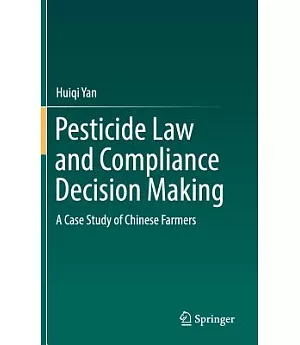This book investigates pesticide compliance in China in order to provide a more comprehensive understanding of compliance and offers some feasible and adaptable suggestions for enhancing the
effectiveness of this compliance. It discusses the weak implementation of Chinese laws and rules and emphasizes the necessity and importance of a compliance perspective in China that focuses on
why laws are obeyed or broken. It examines how vegetable farmers’ perceptions of amoral calculation affect their pesticide compliance behavior and analyzes how the legitimacy of law is related
to compliance to better explain how all the variables interact to shape compliance. It discusses both qualitative and quantitative methods, and uses a large-N qualitative approach, which allows
for systematic analysis and in-depth exploration. This book will help readers to understand compliance in developing China by adopting and developing compliance theories which are broadly
developed in the West.



